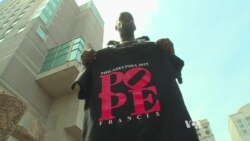One of the main themes of Pope Francis’ papacy has been his acceptance of people who disagree with him, especially on church doctrine.
But that’s not the attitude Susanne Cassidy said she encountered when she met the archbishop of Philadelphia earlier this year, together with other parents who believe homosexuality is not a sin.
"We just wanted him to hear the stories of our families,” said Cassidy, who has two gay children. “And he then said that if we didn’t really believe all of the church teaching, that we maybe shouldn't consider ourselves Catholics."
Francis’ statements on issues as varied as climate change, economic inequality and immigration have all spiced up the political debate in the United States. But when he arrives here Tuesday for a five-day visit, Francis will find particularly deep divisions among his followers over his outreach to gays and lesbians.
American Catholics
Surveys show a majority of American Catholics believe the church is wrong on homosexuality, and they also hold views on abortion and birth control that deviate from doctrine.
And many of them, including Cassidy, feel the pope has been on their side since early in his papacy when he said (in response to a hypothetical question about gay priests) “Who am I to judge?”
"I understand the pope is not going to change church teaching, at least right now,” Cassidy said at her home in suburban Philadelphia. “But his words, of telling people to be kinder and use proper words, is so important."
The archbishop she met with, Cardinal Charles Chaput, has been cast in local media as the anti-Francis, especially after he approved of the firing of a teacher at a Catholic school in his archdiocese because she was married to another woman. The teacher had worked at the school for eight years.
Archbishop Charles Chaput declined to be interviewed for this story.
But Cardinal Joseph Kurtz, president of the U.S. Conference of Catholic Bishops, told VOA that some people were getting the wrong idea about the pope.
"Sometimes the reporting of what Pope Francis says is cast in a way that sounds like a change in doctrine, and he clarifies that, clearly, he’s looking for new pastoral ways to accompany people," Kurtz said.
Helen Alvare, a George Mason University law professor and former adviser to the Vatican on women’s issues, agreed.
"He is reaching out to those who are angry or separated,” she said, “not because he is watering down or changing the teaching, but because he’s saying, there really is something beautiful here in his teachings about family that will help you come to know God.”
Scandals rock faithful
Philadelphia was once a bastion of the U.S. Catholic church. A century ago, it received waves of Catholic immigrants.
But even a dyed-in-the-wool Catholic like Cassidy lost faith in the hierarchy when clergy were put on trial for sex abuse and allegations emerged of a cover-up going all the way up to the former archbishop, Anthony Bevilacqua, who died in 2012.
“If you believed in everything, and all of the sudden, it was hard to believe in anything – for me personally – it was hard to believe anything they said, especially with all the cover ups."
The sex scandals arguably hit Philadelphia’s Catholics harder than in any other American city, and the archdiocese also had to close schools and deal with financial misappropriations.
Pope Francis will get to see firsthand what the church is up against, in a place whose name means the City of Brotherly Love.






